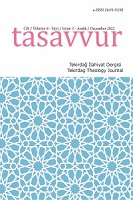Kur’an’da “H-m-m” Fiilinin Kullanımları Üzerinden Yûsuf Suresi 24. Âyetin Değerlendirilmesi
Evaluation of the 24th Verse of Yusuf Surah on the Uses of the Verb "Hm-m" in the Qurʾān
Author(s): Hüseyin YAKARSubject(s): History of Islam, Contemporary Islamic Thought, Hermeneutics, Qur’anic studies
Published by: Tekirdağ Namık Kemal Üniversitesi İlahiyat Fakültesi
Keywords: Qurʾān; Tafsir; The Verb “H-m-m”; Yusuf Surah; Holistic Approach;
Summary/Abstract: The correct understanding of the Qurʾān verses is possible by examining the concepts in them linguistically and revealing the meaning they express in the integrity of the Qurʾān. The verb “h-m-m” is one of these concepts. This verb has been used as sulasi mucerred in a total of seven verses in Āl-i 'Imrān 3/122, al-Nisāʾ 4/113, al-Māʾidah 5/11, at-Tawba 9/13, 74, Yūsuf 12/24, alMu'min 40/5. In our study, the aforementioned verses in which the verb “hm-m” is used, have been examined through the sources of tafsir and based on the meaning of the mentioned word in the unity of the Qurʾān, the verse of "Woman had tend to him. He also tended to the woman. If he had not seen the proof of his Lord. This is what We did to drive away evil and immorality from him. Surely, he is one of Our sincere servants." (Yūsuf 12/24) has been analyzed. First of all, information about the verb “h-m-m” was given within the scope of the conceptual framework, then it was emphasized that in which verses the related verb is used and how it can be considered within the context of the verse in Yūsuf Surah and narrations about revelation reasons of this verse. In the context of the relevant verse, the views in the "Manar Tafsir" have been handled separately since it differs from almost all commentaries in terms of approach. Although it is examined how the relevant verse in Yūsuf Surah is handled in the Bible, this aspect of the subject has not been mentioned because it will not contribute to our study and because of the limited structure of the article. In the handling of our subject, as a method, the integrity of the Qurʾān within the scope of the verb “h-m-m”, the narrations about the revelation reasons and the context of the verse were taken as basis. The aim of our study is to reveal what is meant by the verb “h-m-m” in the mentioned verse, based on the uses of the verb in the Qurʾān and considering the context of the relevant verse and narrations about its revelation reasons. In this context, it can be said that the verb “h-m-m” in the relevant verse of Yūsuf Surah means to decide and attempt an attack in connection with sexual impulses.
Journal: Tasavvur Tekirdağ İlahiyat Dergisi
- Issue Year: 8/2022
- Issue No: 2
- Page Range: 1123-1154
- Page Count: 32
- Language: Turkish

